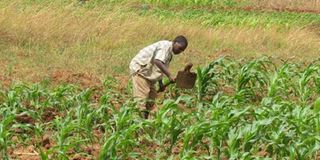Modern farming initiative to benefit 40,000 smallholders

What you need to know:
- The initiative, a brainchild of Alliance for a Green Revolution in Africa (Agra) and ETC Agro Tractors & Implements Ltd (EATIL), brings hope to farmers in a country farming is characterised by low crop yield due to heavy reliance on hoes and low use of improved seeds and fertilisers, the two organisations said yesterday.
Two organisations have launched a programme that seeks to mechanise farming activities of about 40,000 smallholder farmers across Tanzania.
The initiative, a brainchild of Alliance for a Green Revolution in Africa (Agra) and ETC Agro Tractors & Implements Ltd (EATIL), brings hope to farmers in a country farming is characterised by low crop yield due to heavy reliance on hoes and low use of improved seeds and fertilisers, the two organisations said yesterday.
Tanzanian farmers also lack access to funds for them to be able to afford inputs and mechanised equipment, thus forcing the majority of them to engage in subsistence farming.
Agra’s financial inclusion Program, which is financed by the Mastercard Foundation, contributed immensely to the realisation of the partnership.
“The partnership will start its operations in Iringa and Mbeya regions,” a statement reads.
A recent study shows that maize farmers in Tanzania harvest about 3.9 metric tonnes per hectare against the potential of 6-7.5 metric tonnes per hectare. On the other hand, the production potential for rice is as high as 6-8 metric tonnes per hectare, but the actual production is only 2.0-3.8 metric tonnes per hectare.
Conducted by an international nonprofit research and training organisation, the Maize and Wheat Improvement Centre (known by its Spanish acronym of CIMMYT), in 2014, the study concluded that in 2010 there were only seven tractors per 100 square kilometres of arable land in Tanzania.
In comparison, Kenya and South Africa had 27 tractors and 43 tractors per 100 square kilometres respectively. As a result, 92 per cent of Tanzanian farmers still use hoes and farm a few acres, with just five per cent of farm households using tractors and the rest using animal traction.
The partnership will use a model, where lead farmers, mostly the more successful farmers in a village, who may be running other agri-enterprises, are selected after initial due diligence and linked to financial institutions that finance them to purchase the equipment based on identified needs. Lead farmers use the equipment on their land and also lease them out to other farmers at an affordable price.
“We must all work to ensure that farmers achieve the full potential of their land and receive the right income from their labour,” said the Agra head for Tanzania, Uganda and Rwanda, Prof Nuhu Hatibu.
EATIL, which will implement the project, has over eight years of experience in tractor selling and servicing in Tanzania. It will create a digital platform connecting lead and smallholder farmers through a call centre to facilitate hiring of farm equipmen




